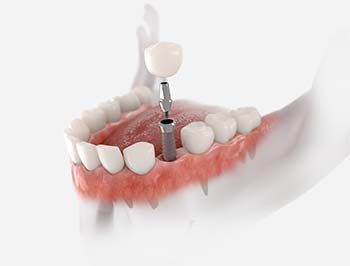One of the most common dental problems is tooth loss. In fact, statistics show that almost 180 million Americans are missing at least one tooth, and 40 million of those have no natural teeth left.
At Arlington Dental Excellence, one of the most common ways we treat tooth loss is with dental implants. Placement of dental implants requires oral surgery, so you will be given local anesthesia. If necessary, you may be provided a sedative or general anesthesia, depending on your needs. These options will be discussed at your consultation appointment.
One of the primary concerns that our patients have when it comes to dental implants is the pain involved. All dental procedures involve some level of pain and discomfort. Here is what you can expect from dental implant surgery and what to do if the pain and discomfort last longer than they should.
Dental Implants Explained

- Endosteal: most common, the implant is inserted into the jawbone.
- Subperiosteal: less common, the implant is placed under the gum but on or above the jawbone.
Dental implant placement involves several appointments over the course of several months to a year. The three main steps of implant placement are:
Implant placement: the implant is the screw that is placed under the gums to serve as the artificial tooth root. You will be given a few months for osseointegration to occur, which is the process of the jawbone healing around the implant to secure it in place.
Abutment attachment: the abutment is the connector that will attach the implant to the crown, or prosthetic tooth.
Crown attachment: the crown is the prosthetic tooth. It will be customized to match your remaining natural teeth so that it blends in. This means that unless you tell people that you have dental implants, they will never know.
Is Dental Implant Surgery Painful?
You will be given local anesthesia to numb the area where we are working, so you should not feel any pain. If necessary, we also offer sedation via nitrous oxide, oral anesthesia, or IV. We have an oral surgeon and anesthesiologist on staff that handles our IV sedation cases.
We will discuss your anesthesia needs during your consultation so that we can include it in your treatment plan.
Pain Following Dental Implant Surgery
Just as you would expect from any surgery, you may have some pain and discomfort for a few days after. This pain will be most acute when the anesthesia begins to wear off and the pain will be centralized around the implant site. You may also have some jaw pain, bleeding at the surgical site, minor bruising, and swelling around the gums or face. This should all clear up within a few days.
In order to manage any pain and discomfort, you will be given some post-operative instructions including:
- Take prescription or OTC medications as directed
- Avoid hard or hot foods
- Use ice packs to reduce swelling
- Rest the day of the surgery and, if necessary, subsequent days based on how you’re feeling
- Aftercare instructions for the surgical site
How long should pain and discomfort last?
As long as everything is healing as expected, pain and discomfort should only last for a few days. In fact, most patients only experience pain for up to 5 days and only need medication for the first couple of days. Some patients are even able to get back to their normal routine the day after. The bruising, jaw stiffness, and swelling may last for up to 10 days after the procedure.
What if dental implant pain lasts for more than 2 weeks?
If you have pain and discomfort that lasts for more than 2 weeks or worsens, you should contact us as soon as possible. This could be a sign of complications.
What if I have pain and discomfort for months or years following implant surgery?
Dental implant pain occurring months or years following surgery could indicate implant failure or peri-implant disease. It is important to note that dental implants have a 95% success rate, which means failure is very rare.
If you have pain when pressing or tapping on the implant site, you may be experiencing implant failure. Some of the other symptoms include:
- Horizontal movement of implant
- Inflammation
- Bone loss
- Inability to attach the crown to the implant
Your risk of implant failure increases with the following:
- Bacteria buildup
- History of periodontitis or gum disease
- Untreated diabetes
- Smoking/tobacco use
- Not practicing proper oral hygiene
In addition, not practicing proper oral hygiene can lead to peri-implant disease, which can lead to inflammation and ultimately, tissue damage and bone loss.
Causes of Throbbing Pain after Dental Implant Surgery
For a few hours following the surgery, you may feel sharp pains as the anesthesia wears off. However, with pain medications and time, this will diminish. Throbbing pain for an extended period of time following surgery is not common. If you do have throbbing pain for more than 2 weeks after surgery, you may have complications such as:
Incision site opening
One of the most common dental implant complications is incision site opening. If this happens, you will experience pain. You will be given an antibiotic to avoid infection or be instructed to use a chlorhexidine rinse several times a day. If the pain doesn’t resolve, you may need additional care.
Improperly fitted implant
In some cases, the jawbone does not properly fuse with the implant. If this happens, the implant may need to be removed and possibly replaced in the future.
Infection
If you do not practice proper oral hygiene, you’re at an increased risk of bacteria getting into the surgical site. This will cause infection to develop and prevent the site from healing properly.
Signs of Dental Implant Complications
If you experience pain, along with the following symptoms, you may be experiencing dental implant complications. Contact us as soon as possible if you have any of the following:
- Fever
- Continuous, excessive bleeding for several hours after the surgery
- Nausea/vomiting
- Increased swelling
We will get you an emergency appointment to determine what steps we need to take to resolve these issues. We are located on Fairfax Drive in Arlington. Our office hours are Monday through Thursday 7:00 AM to 5:00 PM, Friday 8:00 AM to 2:00 PM, and Saturday 8:00 AM to 4:00 PM.




